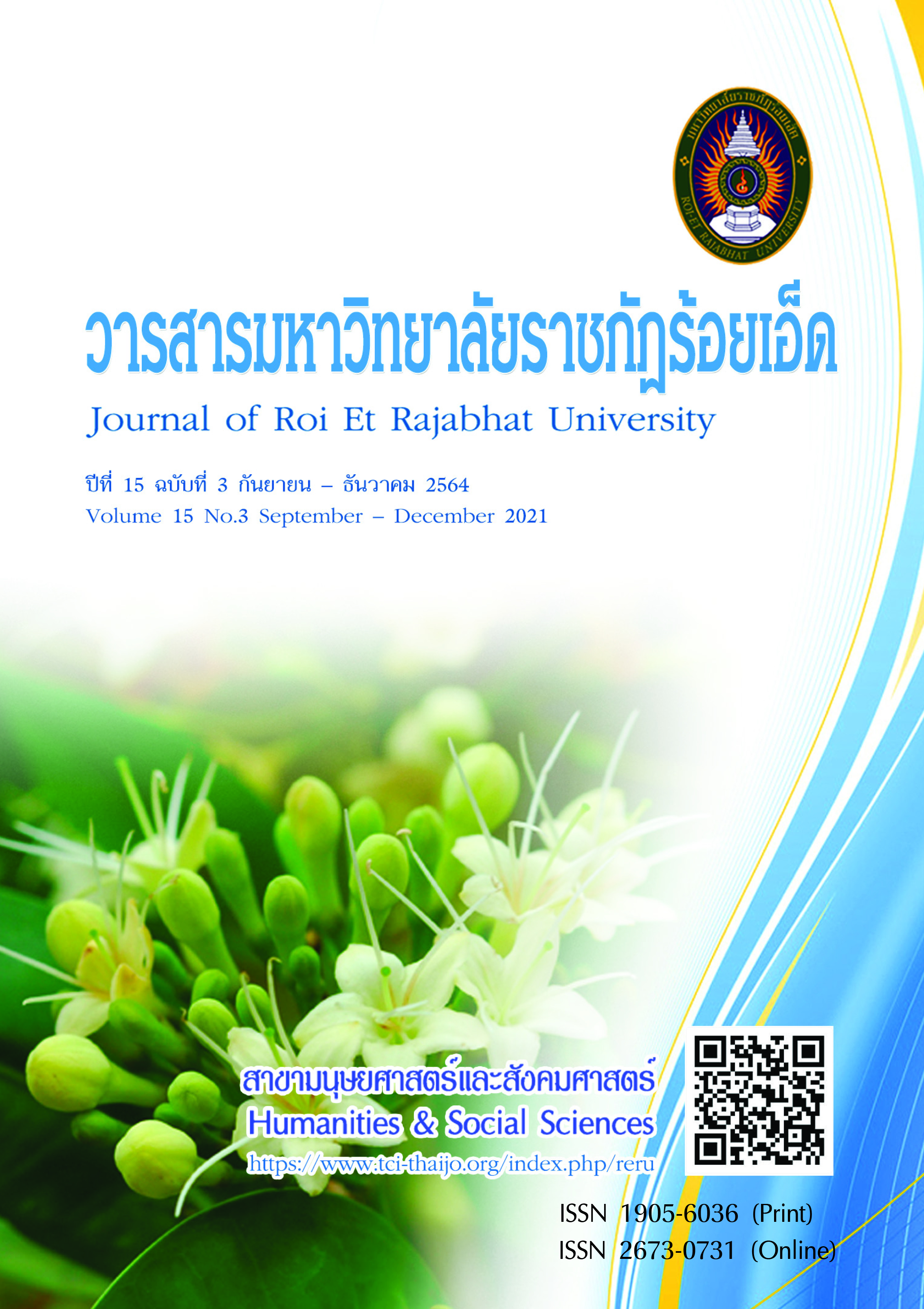Vocabulary Learning Performance of Students in Online Classes
Keywords:
Vocabulary Learning, Online Classes, Traditional ClassesAbstract
Online classes have been necessary during the COVID-19 outbreak. However, their effectiveness as a tool to promote vocabulary acquisition is still being questioned. This is partly because of the lack of teacher-student interaction and concerns about integrity. This research adopted a mixed methodology approach to 1) find out any differences in students’ vocabulary performance between being taught in a traditional classroom setting and a wholly online classroom setting, and to 2) study vocabulary learning strategies used by students during online classes. The participants were 66 freshmen who enrolled in a Business English course at a public university in Thailand. The final findings showed higher mean score in the delayed post-test (online classes) than in the midterm examination (traditional classes). This improvement can possibly be attributed to reported use compensation strategies and cognitive strategies with high frequency to take advantage of ability to find additional information online and to pause the video lessons as much as they needed to. Practical online assessments are still needed to further investigate as learners are prone to cheating which rendered the original post-test invalid to assess learning and required the administration of a proctored delayed post-test.
References
Ahmad Shamsan, M.A., Mohammed Ali, J.K. and Hezam, T. A. (2021). Online Learning amid COVID-19 Pandemic: A Case Study of Vocabulary Learning Strategies. Arab World English Journal, Covid 19 Challenges April 2021, 281–294.
Alessio, H.M., Malay, N., Maurer, K., Bailer, A.J. and Rubin, B. (2017). Examining the Effect of Proctoring
on Online Test Scores. Online Learning, 21(1), 146–161.
Al-Khresheh, M. H. and Al-Ruwaili, S. F. (2020). An Exploratory Study on Vocabulary Learning Strategies Used by Saudi EFL learners. Journal of History Culture and Art Research, 9(2), 288-302.
Al-Malki, M.A. (2020). Quizlet: An Online Application to Enhance EFL Foundation Students’ Vocabulary Acquisition at Rustaq College of Education, Oman. Arab World English Journal, 332–343.
Baker, D.M. and Unni, R. (2018). USA and Asia hospitality & tourism students’ perceptions and satisfaction with online learning versus traditional face-to-face instruction. E-Journal of Business Education & Scholarship of Teaching, 12(2), 40–54.
Çetinkaya, L. and Sutcu, S.S. (2019). Students' Success in English Vocabulary Acquisition through Multimedia Annotations Sent via WhatsApp. Turkish Online Journal of Distance Education, 20(4), 85-98.
Debashis Bir, D. (2019). Comparison of Academic Performance of Students in Online Vs Traditional Engineering Course. European Journal of Open, Distance & E-Learning, 22(1), 1–13.
Dizon, G. (2016). Quizlet in the EFL Classroom: Enhancing Academic Vocabulary Acquisition of Japanese University Students. Teaching English with Technology, 16(2), 40–56.
Dreyer, J. (2014). The Effect of Computer-Based Self-Access Learning on Weekly Vocabulary Test Scores.
Studies in Self-Access Learning Journal, 5(3), 217–234.
Göçen, G. (2020). Turkish as a foreign language learners’ use of vocabulary learning strategies. Journal of Language & Linguistics Studies, 16(1), 316–341.
Grijalva, T.C., Nowell, C. and Kerkvliet, J. (2006). Academic Honesty and Online Courses. College Student Journal, 40(1), 180–185.
Han, M. and Niu, S. (2019). Effect of computer multimedia assisted word annotation on incidental vocabulary acquisition of English reading. International Journal of Emerging Technologies in Learning (iJET), 14(13), 21-32.
Harton, H.C., Aladia, S. and Gordon, A. (2019). Faculty and Student Perceptions of Cheating in Online vs. Traditional Classes. Online Journal of Distance Learning Administration, 22(4), 4.
Hoch, W.A. and Doughe, T.A.O. (2011). Student Perceptions of Hybrid vs. Traditional Courses: A Case Study in Plant Identification. NACTA Journal, 55(4), 8–13.
Ladyshewsky, R.K. (2015). Post-graduate student performance in ‘supervised in-class’ vs. ‘unsupervised online’ multiple choice tests: implications for cheating and test security. Assessment & Evaluation in Higher Education, 40(7), 883–897.
Laffey, D. (2020). Vocabulary Learning Strategies Preferred by Korean University Students. English Teaching,
(4), 81–100.
Marefat, H. and Shirazi, M.A. (2003). The Impact of Teaching Direct Learning Strategies on the Retention
of Vocabulary by EFL Learners. Reading Matrix: An International Online Journal, 3(2), 47-62.
Miller, A. and Young-Jones, A.D. (2012). Academic integrity: Online classes compared to face-to-face classes.
Journal of Instructional Psychology, 39(3/4), 138–145.
Oxford, R. L. (1990). Language Learning Strategies: What Every Teacher Should Know. Heinle & Heinle.
Platzer, H. (2020). The Role of Quizlet in Vocabulary Acquisition. Electronic Journal of Foreign Language Teaching, 17(2), 421–438.
Racca, J.C. and Robinson, S.N. (2016) One Course May Not Fit All: Online Accounting Course Offerings. Journal of Higher Education Theory & Practice, 16(2), 38–45.
Schmitt, N. (2000). Vocabulary in language teaching. New York: Cambridge University Press.
Senkova, O., Otani, H., Skeel, R.L. and Babcock, R.L. (2018). Testing Effect: A Further Examination of Open-Book and Closed-Book Test Formats. Journal of Effective Teaching in Higher Education, 1(1), 20-36.
Shamir, A. and Korat, O. (2015). Educational Electronic Books for Supporting Emergent Literacy of kindergarteners At-Risk for Reading Difficulties—What Do We Know So Far?. Computers in the Schools, 32(2), 105–121.
Stack, S. (2015). Learning Outcomes in an online vs traditional course. International Journal for the Scholarship of Teaching & Learning, 9(1), 1–18.
Tahir, M.H.M., Albakri, I.S.M.A., Adnan, A.H.M., Shaq, M.S.Y. and Shah, D.S.M. (2020). The Application of Visual Vocabulary for ESL Students’ Vocabulary Learning. Arab World English Journal, 11(2), 323–338.
Wang, Y. (Tina). (2019). Effects of L1/L2 Captioned TV Programs on Students’ Vocabulary Learning and Comprehension. CALICO Journal, 36(3), 204–224.
Watson, G. and Sottile, J. (2010). Cheating in the Digital Age: Do students cheat more in online courses?. Online Journal of Distance Learning Administration, 13(1).
Yang, J. (2014). Tertiary ESL learners' use of vocabulary learning strategies in reading and writing tasks: A mixed methods study (Order No. 3628780). Retrieved June 10, 2021, From https://www.proquest.com/dissertations-theses/tertiary-esl-learners-use-vocabulary-learning/docview/1561147438/se-2?accountid=43140
Zhang, T., Gao, T., Gail, R. and Zhang, W. (2007). Using Online Discussion Forums to Assist a Traditional English Class. International Journal on E-Learning, 6(4), 623–643.
Downloads
Published
How to Cite
Issue
Section
License
บทความที่ได้รับการตีพิมพ์เป็นลิขสิทธิ์ของวารสารมหาวิทยาลัยราชภัฎร้อยเอ็ด
ข้อความที่ปรากฏในบทความแต่ละเรื่องในวารสารวิชาการเล่มนี้เป็นความคิดเห็นส่วนตัวของผู้เขียนแต่ละท่านไม่เกี่ยวข้องกับมหาวิทยาลัยราชภัฎร้อยเอ็ด และคณาจารย์ท่านอื่นๆในมหาวิทยาลัยฯ แต่อย่างใด ความรับผิดชอบองค์ประกอบทั้งหมดของบทความแต่ละเรื่องเป็นของผู้เขียนแต่ละท่าน หากมีความผิดพลาดใดๆ ผู้เขียนแต่ละท่านจะรับผิดชอบบทความของตนเองแต่ผู้เดียว





